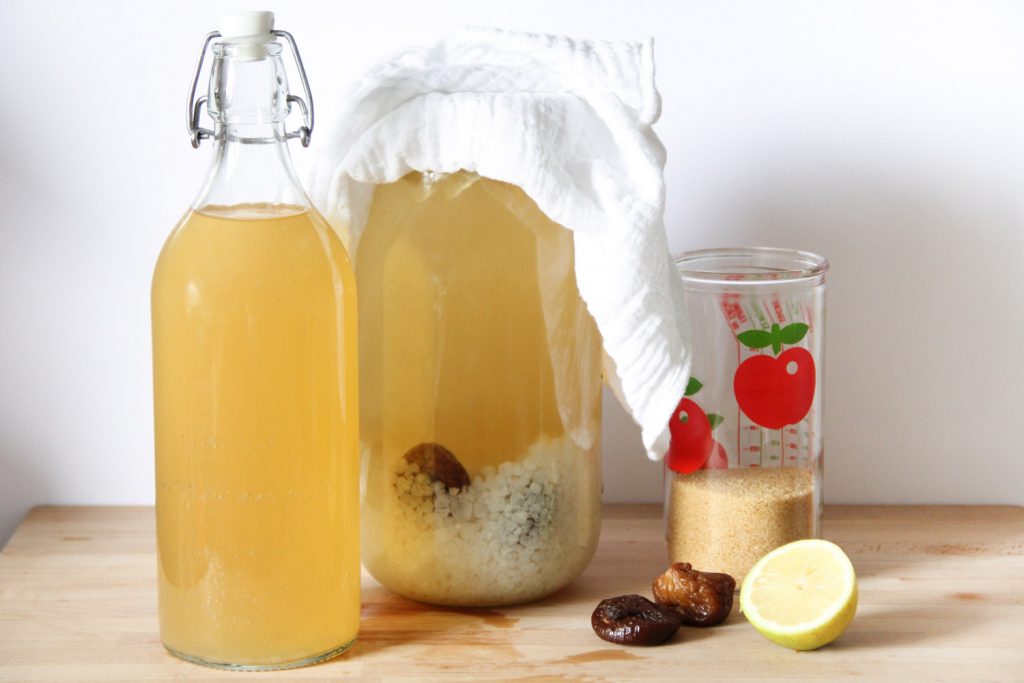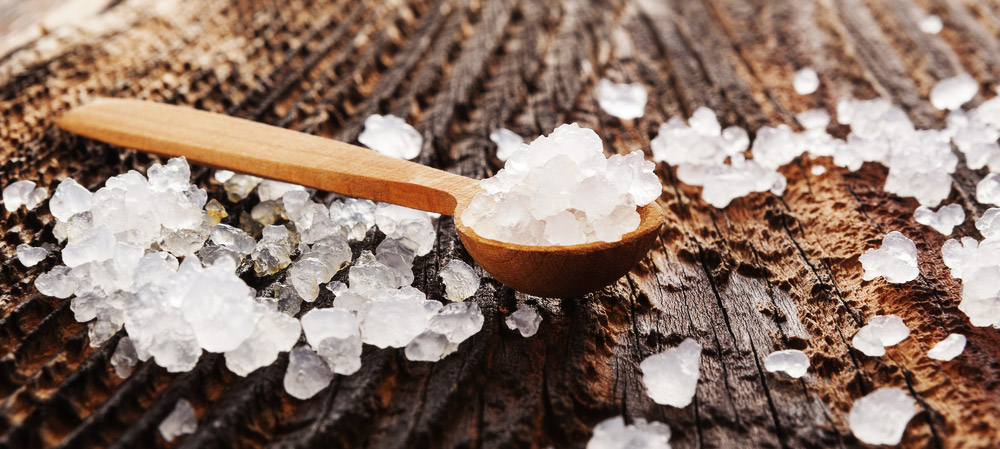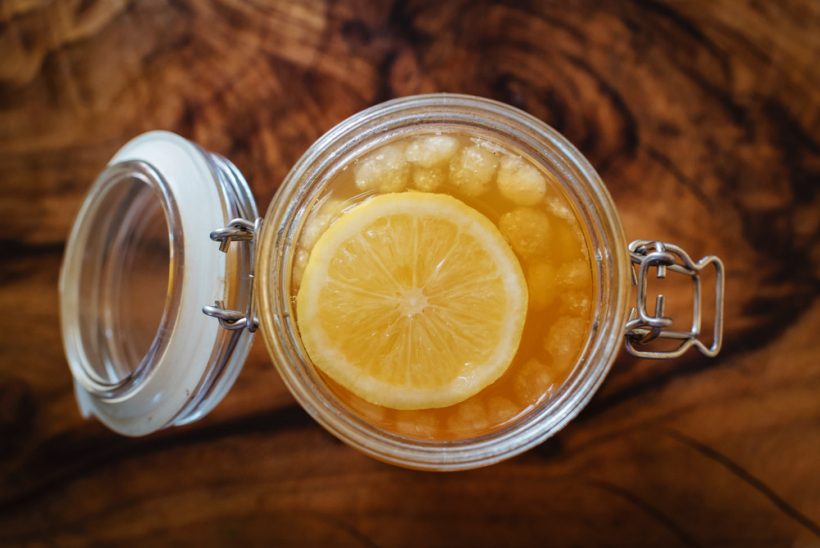Fruit kefir
Today we're going to talk about a new soft drink packed with health benefits! It's obviously not the latest line of Coca-Cola, but a healthy alternative to sweetened soda that's lightly sparkling and great for your intestines.
It's filled with probiotics, sweet to the taste, and best of all, you can make it yourself at home, economically and almost endlessly! This drink that is gaining popularity is the fruit kefir, also called water kefir!
WHAT IS FRUIT KEFIR?
Fruit kefir is nothing more and nothing less than a probiotic drink infused with kefir grains. At the very base, these kefir grains would have been found in the prickly pear, the fruit of a Mexican cactus. These grains look like small clusters of microorganisms that are used to ferment a drink (here water, but it can be milk to make milk kefir, we will come back to that).
These microorganisms are composed of a symbiotic balance of lactic acid bacteria and yeasts, and can be used to grow juice, sugar water, and even coconut water. This means that kefir contains strains of bacteria that are beneficial to the organism.
The fruit kefir that you get after brewing these kefir grains is very thirst-quenching, I would say the drink tastes like Kombucha. The fruit kefir has a low glycemic load and does not contain caffeine (perfect for weaning oneself from coffee).
You have probably never heard of it, but you should know that kefir beans have long been used in European and Central Asian folk medicine for their fresh taste and alleged health benefits. It has been suggested that they contain up to 40 strains of beneficial bacteria to stimulate the system and fight carcinogens, tumors and other health threats.
We owe the fruit kefir to Adolfo Lutz, who is said to have discovered it in 1899. Later, Doctor Élie Metchnikoff, an eminent Russian microbiologist (Nobel Prize of medicine all the same), will devote to the kefir some research which will stick to it definitively the label of probiotic. Élie will discover that kefir prevents putrefaction of food passing through the intestine, and that it is de facto excellent for the intestinal flora.
WHAT IS THE DIFFERENCE BETWEEN FRUIT KEFIR AND MILK KEFIR?
The base remains the same, our small grains of kefir.
The milk kefir is a little more popular than its cousin, you can even find it in some stores now. You can make it with any type of milk, cow, sheep, goat...
To the taste, it is a little more acidic than water kefir, it is reminiscent of Greek yogurt. Some manufacturers incorporate a little vanilla or fruit to make it sweeter in the mouth and enhance the flavors.
Water kefir, on the other hand, does not involve a dairy product, it is brewed from water and sugar and is somewhat reminiscent of soda to taste. In the final stage, the drink contains fewer bacterial strains than milk kefir.
The two types of kefir drink have different properties and should therefore be used differently. For example, milk kefir can be used in certain recipes and fruit kefir can be reserved for direct consumption.

WHAT ARE THE BENEFITS OF FRUIT KEFIR?
In addition to its low sugar content and not unpleasant taste, here is a list of benefits that may make you want to make your own water kefir at home.
1. It's very easy to do
If you want homemade fruit kefir, count 3 days, a simple process and 5 minutes of preparation. The rest is waiting. That makes water kefir one of the easiest probiotic drinks to prepare in the world.
2. It is a probiotic more powerful than yogurt.
Those who want to increase their population of beneficial bacteria often turn to yogurt, the reality is that they'd better give kefir a chance!
Kefir grains contain about 40 strains of yeast and bacteria, all of which can aid digestion and improve your weight management. Kefir is excellent for a natural census of the intestinal flora.
Some probiotics contained in water kefir have impressive antibacterial effects, including kefiri lactobacillus, a compound found only in kefir. Studies show that keeping it in your body can inhibit the growth of harmful bacteria, including E. coli and salmonella.
3. Boosts the immune system
If you're looking to boost your immune system, water kefir may be a good option.
The drink contains a wealth of nutrients such as biotin and folate that stimulate the immune system and protect cells. Along with probiotics, these compounds inhibit the growth of predatory bacteria that can cause infections. Similarly, kefir has been found to contain an antimicrobial agent called kefiran that can prevent the growth of candida.
4. Good for the skin
The digestive system is at the center of your immune system, so it's not uncommon for seemingly unrelated health problems to be related to your intestine.
Certain conditions such as acne and eczema are sometimes linked to disturbances in the natural balance of your intestinal bacteria. Drinking kefir restores the balance in your body, which can regulate skin problems. In addition, the kefiran compound can improve the skin's ability to heal wounds and protect connective tissue.
5. A good ally for those suffering from digestive problems
Kefir probiotics bring balance to your digestive system, so they can be effective in eradicating intestinal problems such as diarrhea, irritable bowel syndrome and even ulcers. If your body regularly struggles after meals, a glass or two of kefir water can help you find relief.

HOW TO MAKE YOUR HOMEMADE FRUIT KEFIR?
The benefits of water kefir have seduced you and you now want to make some yourself? The first step is to choose between kefir grains and starter culture powder.
Any kefir currently manufactured comes from one of these two methods, however, "real kefir" is made from kefir grains. Rather light in color (depending on the sugar content of the drink), these grains can be reused almost indefinitely. With each round of kefir you produce, your kefir grains will tend to increase by about 10%. For true kefir lovers, those who consume kefir on a regular basis, this method saves money quickly. You should know that tradition dictates that kefir grains should be offered to you by a person who makes them. Since these grains multiply among themselves, we quickly find ourselves having a multitude of them, so giving them away is a good solution. Spread the kefir!
As for the starter culture of powdered kefir, it can be dissolved in water to obtain a "fast" kefir. You will certainly pay less for the initial mix, but most can only be reused about five times before they lose their intensity. In addition, kefir grains generally provide a wider range of probiotics for drinking.
Powdered starter cultures are ideal for anyone who starts with fruit kefir and does not want to commit to continuous brewing, especially without knowing whether they will like the taste or not.
HOW TO MAKE YOUR OWN FRUIT KEFIR FROM A POWDERED CULTURE?
Is this your first time? Then it's best to start with a powder culture just to see if you like the taste and are ready to commit to continuous production.
YOU WILL NEED :
• a large glass jar.
• a wooden stirring utensil.
• a clean cloth and a rubber band to fix the lid.
• a starter culture bag.
• one liter of mineral water with 3 tablespoons of unrefined sugar.
Instructions :
1. Heat your sugar water to room temperature and pour it into the large jar.
2. add the starter culture, stirring gently until dissolved.
3. cover the bottle with the tea towel and elastic band and let it stand at room temperature for a good 16 hours. You can taste it during the process to see if it is ready.
4. when you like the taste, cover the jar tightly and keep it in your refrigerator for a maximum of two weeks.
HOW TO MAKE KEFIR WITH KEFIR GRAINS?
You tried it with powder, and you liked it! Well, it's time to get down to business, the real kefir grains.
And it's no more complicated than that.
YOU WILL NEED :
• 2 large tablespoons of kefir grains (about 20g)
• 2 tablespoons organic cane sugar
• a large glass jar
• a colander
• a tea towel and a rubber band
• fresh and organic fruit
• an organic lemon untreated after harvest
• 1.5L mineral water
• 2 organic dried figs
Instructions :
1. fill your jar with water and dissolve the sugar in it.
2. add the fig, a few slices of lemon and the kefir grains.
3. cover with the cloth to protect from the light in particular (the kefir is sensitive to it) and let it rest at room temperature for 2 days (a good indicator, the figs that will rise to the surface).
4. kefir is ready when its taste is slightly fermented.
5. filter your kefir with a strainer, and add the fresh organic fruit.
6. cover it hermetically and put it in a cool place for 24 hours (if you use a metal cover, try to open it every 6 hours to release the pressure).
7. when fruit floats, it's good for tasting!
Note: The more you let the kefir ferment, the lower the total sugar content will be. Beyond three days, the grains will begin to starve, which can alter the taste of the drink.
There are many variations to this recipe.


